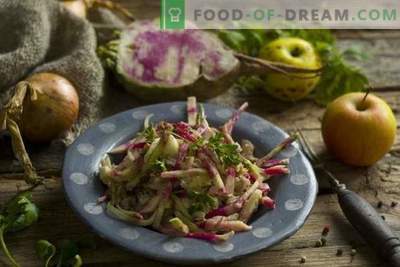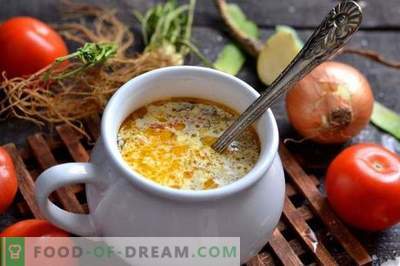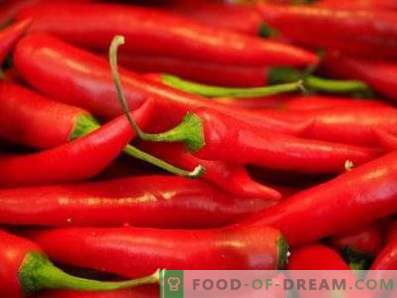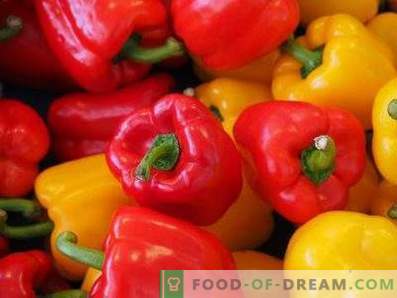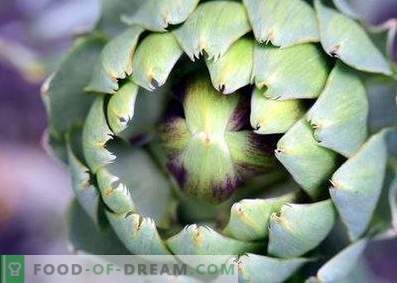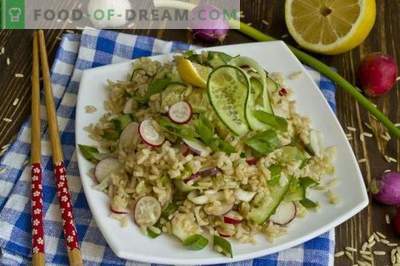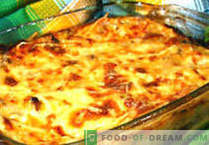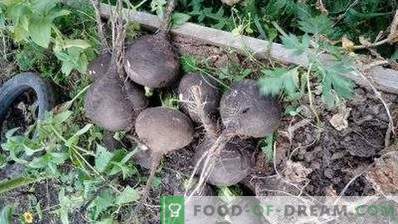
Black radish is a plant belonging to the Cabbage family. The history of this vegetable is rooted in the deep past. Scientists have so far failed to establish where this crop was first grown. There is only a hypothesis, according to which its homeland is the coast of the Mediterranean Sea.
Black radish - a plant with a thickened rounded root, covered with a dense dark skin. Root pulp - crispy, juicy, white with thin translucent veins. The above-ground part of the plant is represented by a rosette of green pinnatile leaves of lyre form. Black radish can produce an arrow and bloom with small pink, white or purple flowers. The fruit of the plant is a wide, swollen pod containing rounded brown seeds.
Radish root vegetables are valued in cooking for their unusual pepper taste and pungent aroma. They are eaten raw, dried, boiled, baked, fried, used to make soups, salads, vegetable and meat stews, and snacks. Pulp and radish juice is an effective remedy to combat colds, infectious diseases and other disorders in the body.
Nutritional value of black radish
100 g of vegetable contains:
- 6, 668 g of carbohydrates;
- 2, 076 g of dietary fiber;
- 1, 879 g of proteins;
- 0, 177 g of fat;
- 87, 933 g of water;
- 086 g of organic acids;
- 0.936 g of ash.
Digestible carbohydrates in a 100-gram portion of the product - sugar (6, 392 g), dextrins and starch (0, 276 g).
Vitamins in the flesh of the vegetable
Black radish is a rich source of vitamins. 100 g of product contains:
- retinol equivalent (A) - 2, 944 mcg;
- beta-carotene - 0, 018 mg;
- thiamine (B1) - 0, 026 mg;
- Riboflavin (B2) - 0, 027 mg;
- pantothenic acid (B5) - 0, 176 mg;
- pyridoxine (B6) - 0, 059 mg;
- folic acid (B9) - 24, 786 μg;
- ascorbic acid (C) - 28, 677 mg;
- tocopherol equivalent (E) - 0, 093 mg;
- The niacin equivalent (PP) is 0. 589 mg.
In addition, a rare fat-soluble vitamin K, phylloquinone, was found in black radish. The concentration of this compound is 1, 288 µg per 100 g of product.
Black Radish Calories
In a 100-gram serving of raw black radish - 35, 813 kcal. The caloric content of 100 g of this product in boiled form is 25, 617 kcal, in baked - 36, 012 kcal, in fried - 89, 114 kcal, in dried - 118, 906 kcal. The energy value of black radish juice is 18, 304 kcal per 100 ml.
Useful items in black radish
Macro elements in 100 g of product:
- potassium - 356, 216 mg;
- calcium - 34, 902 mg;
- magnesium - 21, 393 mg;
- sodium - 12, 826 mg;
- phosphorus - 25, 933 mg.
Trace elements in a 100-gram portion of black radish:
- zinc - 0, 279 mg;
- iron - 1, 126 mg.
Rules for the selection and storage of black radish
When choosing black radish, preference should be given to medium-sized root crops with elastic, thick “tails”. On their surface should not be dirt, gray or white plaque, mold, rot, cracks and other damage. High-quality root vegetables can not be soft. Black radish should be stored in a dark, cool place at a temperature of +1 to +3 ° C and a relative humidity of about 90% (for example, in a refrigerator or cellar). Summer varieties of this culture are stored in such conditions for about 20 days, and winter - up to 8 months.
Useful properties of black radish
- Black radish is a low-calorie product. Salads, soups and other dishes made from this vegetable are useful for people who want to lose weight.
- Black radish contains substances with choleretic and diuretic effects. Its juice has been proven to help dissolve sand and stones in the bile ducts and kidneys.
- Black radish pulp has bactericidal properties. Phytoncides contained in it destroy pathogenic microflora, increase the body's resistance to infectious diseases, strengthen the immune system.
- Black radish juice with honey has expectorant properties. This drink is useful to people suffering from whooping cough, bronchitis and other diseases, accompanied by a strong unproductive cough or hemoptysis.
- In the vegetable pulp there are compounds capable of regulating the production of bilirubin and accelerating its excretion from the body. The dishes prepared from it help to speed up the recovery from jaundice.
- In alternative medicine, black radish juice is used as a painkiller. Liquid massages problem areas for bruises, arthritis, radiculitis.
- Substances present in the pulp of black radish strengthen blood vessels and myocardium, remove excess cholesterol from the body and prevent the formation of atherosclerotic plaques. People who eat dishes daily with the addition of this vegetable are less likely to experience cardiovascular diseases.
- Sulfurous essential oils and fiber, contained in black radish, have a healing and stimulating effect on the digestive system. Dishes prepared from this vegetable increase appetite, increase intestinal peristalsis, stimulate the production of digestive juice, heal the intestinal microflora, help to cope with prolonged constipation, promote elimination of excess fluid, poisons, toxins and slags from the body, normalize water-salt balance.
- Lysozyme contained in the pulp of black radish effectively fights parasites, inhibits the reproduction and growth of fungal microflora.
- Vitamins and other nutrients present in this vegetable help reduce the risk of disruption in the central nervous system. People who regularly include it in their diet are less likely to get irritated and depressed, they can more easily endure stress, they sleep well.
- Black radish juice, combined in equal proportions with beet juice, helps speed up the healing process for anemia. Means drink a glass a day, dividing the daily dose into 2 doses.
- Black radish is rich in compounds that stimulate the formation of lymph and accelerate the lymph flow.
- Juice of this vegetable is an effective remedy for antritis. The liquid is half diluted with water and twice a day instilled into the patient's nostrils (3-4 drops).
- Black radish pulp has mild laxative properties.
- A drink is made from the juice of this vegetable, which makes it possible to reduce the sugar content in the blood. Bay leaves (7 pcs.) Pour 100 ml of boiling water, insist until the liquid is completely cooled. Strained infusion diluted with 25 ml of radish juice and drink shortly before meals. The procedure is repeated four times a day.
- With a cold and a strong cough, a black radish compress helps. Vegetable pulp is grated, wrapped in gauze and applied to the breast for 25 minutes.
- Black radish contains substances that can reduce and maintain normal blood pressure. Folk healers recommend that hypertensive patients drink throat a mixture of lemon, beet, horseradish, black radish and carrot juice three times a day. All the ingredients for the preparation of this drink must be taken in equal proportions.
- Specialists in the field of alternative medicine use black radish to combat dermatological diseases. The juice of this vegetable is combined with red wine (1: 1) and kept on low heat until the mixture thickens. The resulting ointment up to 6 times a day grease problem areas.
- Dishes of black radish help to increase potency in men, stimulate the work of the sex glands. It is proved that with regular consumption of this product reduces the risk of prostatitis.
- Black radish juice is an effective remedy for baldness. Liquid is rubbed into problem areas 45 minutes before washing the head. After this procedure, the hair stops falling out, grows well, becomes obedient, shiny and takes on a well-groomed appearance.
- A mask is prepared from the pulp of black radish, which activates the production of collagen, rejuvenates the skin, eliminates unwanted pigment spots. A medium-sized vegetable is ground in mashed grated, combined with sour cream (3 tablespoons) and honey (4 tsp.). The mixture is spread over the face, neck, décolleté and hold until it dries. After that, the mask is washed off with a decoction of herbs or warm water.
Contraindications and harm of black radish
- Black radish should be introduced into the diet gradually, in small portions. Abuse of this product can lead to diarrhea, increased flatulence in the intestines, damage to the mucous membranes of the gastrointestinal tract and the development of dental diseases.
- Black radish is contraindicated in toxic goiter, peptic ulcer, gastritis, exacerbations of chronic pancreatitis, liver inflammation, serious cardiovascular diseases, glomerulonephritis, after suffering a heart attack.
- Black radish can provoke allergic reactions. Therefore, people who have previously been allergic to vegetables of the Cabbage family should exclude this product from their diet.
- Dishes of black radish are contraindicated for pregnant women. It is undesirable to give them to children under the age of 5 years.



